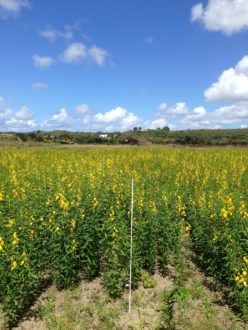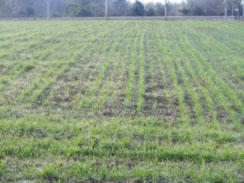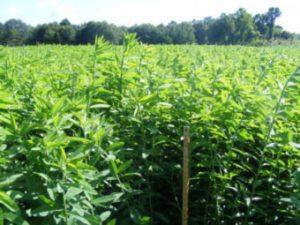TUSKEGEE, Alabama – Small ruminant producers in the Southeast can potentially graze their goats year-round on a forage-based production system by incorporating a summer legume, such as sunn hemp, into the traditional bermudagrass pasture.
Tuskegee University animal scientist Byeng-ryel Min found that a summer sunn hemp/bermudagrass forage mixture, or sunn hemp alone, followed by winter wheat, was healthier for the animals, more beneficial to the soil, and safer for the environment than bermudagrass alone. Incorporating the tropical legume into a forage-based system increased the growth of the grazing goats, increased forage biomass, improved soil quality and reduced the need for chemical fertilizers.
“We feel that using proper legume forages for the summer legume forage followed by winter forages can provide for profitable year-round foraging system for producers. However, combination of forages used for grazing should be selected to optimize animal performance, enhance soil property and reduce environmental impacts,” said Min. “We believe that sunn hemp alone or a sunn hemp plus bermudagrass combination will increase protein outputs as well as restore nitrogen in soil, thus reducing dependency on petroleum-based fertilizers.”
The project was funded through a two-year, $15,000 Southern Sustainable Agriculture Research & Education On-Farm Research Grant (OS14-088), “On-farm Evaluation and Use of Sunn Hemp (Crotalaria juncea L.) Legume to Improve Sustainable Meat Goat Production and Health in Southern USA.”
Min and his colleagues planted three forage combinations in duplicates on six pasture paddocks of one half acres each and grazed 36 cross breed goats (six goats in each of the six paddocks) for 58 days during the two-year study. They collected such data as pasture quality and soil fertility changes, animal health and performance, soil quality, economics and on-farm adaptability.
Results indicated that goats grazing on sunn hemp or a sunn hemp/bermudagrass mixture provided high nutritive value for goats, which grew 62 percent to 67 percent quicker when compared to conventional bermudagrass pastures; forage biomass production was 30 percent to 70 percent higher when sunn hemp was incorporated into the forage production system; the addition of sunn hemp fixed 25 percent to 30 percent more soil nitrogen and organic matter; and the addition of sunn hemp reduced fertilizer costs in the overall system, about $109/hectare/year.
“The sole bermudagrass pasture system was found to be the least sustainable because of the need for higher amounts of fertilizer, supplemental feeds, and anthelmintics (medicines that kill parasitic worms),” said Min. “It appears that sunn hemp or a sunn hemp/bermudagrass mixture can fit well into a sustainable goat production system in the Southern U.S.”
The research was conducted at the Caprine Research and Education Unit at the Tuskegee University George Washington Carver Agriculture Experiment Station.
Published by the Southern Region of the Sustainable Agriculture Research and Education (SARE) program. Funded by the USDA National Institute of Food and Agriculture (NIFA), Southern SARE operates under cooperative agreements with the University of Georgia, Fort Valley State University, and the Kerr Center for Sustainable Agriculture to offer competitive grants to advance sustainable agriculture in America's Southern region. This material is based upon work that is supported by the National Institute of Food and Agriculture, U.S. Department of Agriculture, through Southern Sustainable Agriculture Research and Education, under sub-award number: OS14-088. USDA is an equal opportunity employer and service provider. Any opinions, findings, conclusions, or recommendations expressed in this publication are those of the author(s) and do not necessarily reflect the view of the U.S. Department of Agriculture.


